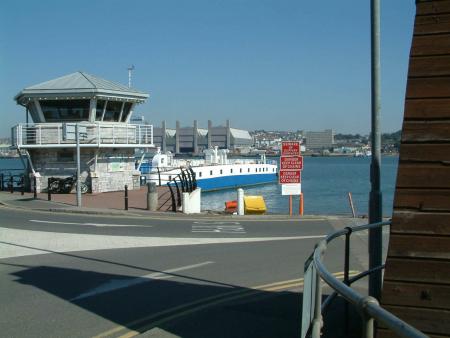Full News Report
6th October 2023
Bridge and Ferry reserves running perilously low
INDEPENDENT Cornwall councillor Armand Toms has called on Central Government to contribute to the running costs of the Tamar Bridge and Torpoint Ferries, in much the same way as Welsh and Scottish governments aid crossings in their bailiwicks.
Cllr Toms, who represents the Looe East and Deviock county ward (including Morval Parish), says that the finances of the bridge and ferries are so linked, it is impossible to divide them.
Currently, the Tamar Bridge and Torpoint Ferry Joint Committee (comprised of five councillors from each of the two joint authorities, Plymouth City Council and Cornwall County Council) is believed to be paying £4.8-million in debt payments for the two crossings.
“As I have said many times the bridge was built for local traffic and the greatest impact on it was when the A38 was connected to it,” said Cllr Toms, who is a member of the joint committee.
“Yet both National Highways and the bridge legal services department are unable to give me any documentation of how and why this was done. It had an impact on the ferries and the loss of traffic has an impact on its finances.”
Both crossings are highly valued by the people of Morval Parish and the wider South East Cornwall area, whose day-to-day lives and health service provision are often inextricably linked.
In 1997 the joint committee had around £14-million in reserves that had been accumulated as a fund to pay for much-needed replacement Torpoint Ferries.
But when an EU Directive on vehicle loads was implemented, requiring all UK bridges to be able to accommodate 44-tonne lorries instead of 34-tonnes, a £33-million major strengthening upgrade had to be undertaken.
To minimise the impact on the public, the preferred re-design of the Tamar Bridge involved the construction of the cantilever lanes on each side of the bridge crossing, initially as diversion lanes during main deck replacement, and then as permanent additional lanes.
But the final bill emptied the joint committee’s reserves, and tolls had to be increased because (at that time) local authorities could not readily borrow to fund capital projects.
The 2003 Local Government Act and the 2003 Capital Finance Regulations introduced a ‘Prudential Code’ that enabled borrowing for capital projects going forward, the first of which was for the new Torpoint Ferries in 2004-05.
But, as a result of the cost of the strengthening and widening bridge project, the joint committee’s parent authorities had to cover a shared debt of around £4-million for a short period in 2001-02 until the increased toll income could be used to pay it back.
“Over the years National Highways, or whatever they have been called, have continued to used a bridge they failed to finance as their own,” said Cllr Toms.
“There has been no support for the upkeep of the bridge or ferries, yet there has been money for infrastructure in London and North East Midlands for so many years.
“Look at London, £5.2-billion for the Elizabeth Line; £1.2-billion for Covid recovery, and one-third of the costs for the repair of the Hammersmith and Fulham bridges.
“More than £100-million has been spent on the Humber Bridge; £35-million for the Tyne Bridge… do I really need to go on?
“Billions are still being spent on the Midlands and the North today, yet we still have to pay for our own infrastructure.”
‘Making money, not saving lives’
CORNWALL councillor Armand Toms, (pictured), recently called for government action to upgrade the A38 in South East Cornwall as a matter or urgency on road safety grounds but he has been told that National Highways will not be doing anything until after 2030 and then only ‘tinkering’ with the route.
“We will get average speed cameras from Saltash to Trerulefoot and also in the Saltash Tunnel, I wonder how much these will bring in?” He said.

“The £20-million being spent on the Saltash Tunnel will not save lives but £20-million on a overpass to take out the junctions at Menheniot and Looe turnings will.
“The current proposals are about making money, not saving lives.”
Month-long consultation over tolls increase
COUNCILLOR Armand Toms’ criticisms come at a time when the joint committee has launched a month-long consultation on the future funding of the two crossings.
Up for debate are proposals to address the financial shortfall caused by the impact of higher-than-expected levels of inflation and interest rates; extreme rises in energy and fuel costs, and ongoing reductions in traffic levels on the Tamar Bridge and Torpoint Ferries.
Between them the bridge and ferry crossings carry around 18-million vehicles a year (including two-million on the ‘floating bridges’ between Torpoint and Devonport) and 50,000 vehicles on a busy weekday, but those traffic levels are still only 90 per cent of pre-Covid levels with a corresponding effect on income.
Said a statement issued by the bridge operators, Tamar Crossings: “We are now operating in deficit and have minimal reserves.
“The crossings operate on a self-financing basis with no subsidy from either the government or the owners of the two crossings – Plymouth City Council and Cornwall County Council – both of which have very pressing demands on their finances and are not in a position to offer financial support.
“The organisation’s reserves are forecast to be completely depleted during 2024-25, with Tamar Crossings facing a significant and growing financial deficit unless there is intervention to increase income.
“Neither council is in a position to fund a deficit and there is currently no prospect of support from government, although the joint committee and the two councils are continuing to actively lobby for that support.”
The aim of the consultation is to provide information to users and key stakeholders on the joint committee’s finances, and to seek views on both the immediate proposals and the future structure of charges.
Members of the public will be asked for their opinions on five options that are under consideration:
- Increase tolls for cars to £3.00 cash and £1.50 tag. “This option follows the previous approach of increasing both cash and tag rates by similar percentages, keeping the 50 per cent discount.
“It would, however, provide very little resilience and is within the margin of error on our forecasts. If costs increase faster than expected, traffic levels are lower than anticipated or there are other unexpected events impacting on finance, further increases will be required.”
- Increase tolls for cars to £3.20 cash and £1.60 tag. “This option also follows our previous approach of pro-rata increases but provides the resilience that is missing from Option No.1 while maintaining a 50 per cent discount.”
- Increase tolls for cars to £3.00 cash and £1.80 tag. “This option keeps the ceiling price of tolls the same as Option No.1 but addresses resilience concerns by reducing tag discount.”
- Increase bridge tolls for cars to £3.00 cash and £1.50 tag, and ferry tolls to £4.00 cash and £2.00 tag. “This option reflects the higher unit cost of moving traffic across the Tamar via the ferry.
“The option provides a satisfactory level of resilience compared to the similar option without supplementary charges for ferry users. The option does, however, change the historical approach of equal pricing and may have an effect on usage patterns, encouraging less use of the ferry and more traffic at the bridge.”
- No change in tolls. “This ‘do nothing’ option is being presented but this is not a practical way forward as it carries very significant risk for service delivery into the future.”
Tomorrow (Saturday, October 7) and next Tuesday (October 10), those using either of the Tamar crossings will be invited to participate in a structured survey. Those paying cash will be handed a leaflet and questionnaire with tag users receiving an e-mail or letter in the week following their crossings asking them to complete the same form. This structure ensures feedback is received from a balanced cross-section of users.
A set of specific key stakeholders will also be contacted directly including MPs, haulage industry representatives, parish and town councils, emergency services, interest groups and local politicians.
“We are also keen to receive written feedback from any interested parties who were not part of the structured survey,” said Tamar Crossings.
People can also provide written feedback by e-mail at consultation@tamarcrossings.org.uk or by writing to Tamar Crossings at Tamar Bridge Office, Pemros Road, St Budeaux, Plymouth PL5 1LP.
“The crossings over the Tamar are crucial to local residents and businesses, as well as to people visiting Plymouth, Devon and Cornwall” said joint chairman Cllr Martin Worth, the Conservative county councillor for the Saltash, Trematon and Landrake ward.
“We recognise that many local people have no choice but to use the crossings, particularly to access health care and education services. Even with the tag discount, the cost of living crisis means that some are already struggling and would not be able to cope with any further increases.
“However, we are facing unprecedented financial challenges and need to ensure that we have funding to continue to deliver these services.
“We have already written to the local MPs and are awaiting all the responses to come in so we can approach Ministers together with one voice from the South West.
“However, in the meantime, as our only source of revenue is currently toll charges, we need to go ahead with local consultation to seek the views of people using the crossings on the options which are before us”.
The consultation will run until October 29 following which the information gathered will be analysed and presented to members of the joint committee at their meeting in December .
‘Booth free’ tolling on future shopping list
MORE than 110 staff are employed to deliver the two-crossing River Tamar service, 24 hours a day, 365 days a year.
During the past few years significant works have been carried out at the bridge and the ferries.
These include a major upgrade of tolling systems and the introduction of contactless payment at both crossings.
Painting, kerbs and re-surfacing totalling nearly £17-million has been completed on the bridge – and they are about to begin significant works on the deck bearings and support cables.
A cycle of refits is under way for the three Torpoint Ferry vessels. The first was completed in June this year, with the other two scheduled for 2024 and 2025.
During subsequent refits they will be replacing the chain gantries that support the tensioning weights for the chains. They will also be improving the shoreside pedestrian and traffic management system, involving around £7.5-million of further investment.
Said a statement from Tamar Crossings: “We will be progressing work to improve and update ferry traffic control systems shortly and future aspirations include ‘booth free’ tolling at the Tamar Bridge and in due course there will be further cycles of bridge re-surfacing and re-coating.”
Increasing cash tolls involves applying to the Department for Transport under a formal statutory process, and typically takes many months to get approval.
It means that any increase in cash tolls is unlikely to come into effect until at least a year from now.


